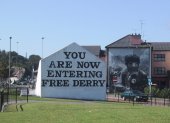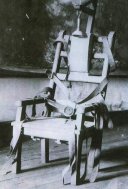Into our townlan', on a night of snow,
Rode a man from God-knows-where;
None of us bade him stay or go,
Nor deemed him friend, nor damned him foe.
But we stabled his big roan mare:
For in our townlan' we're a decent folk,
And if he didn't speak, why none of us spoke,
And we sat till the fire burned low.
We're a civil sort in our wee place,
So we made the circle wide
Round Andy Lemon's cheerful blaze,
And wished the man his lenth o'days;
And a good end to his ride,
He smiled in under his slouchy hat
Says he: "There's a bit of a joke in that,
For we ride different ways."
The whiles we smoked we watched him
From his seat fornenst the glow,
I nudged Joe Moore, "You wouldn't dare
To ask him who he's for meetin' there,
And how far he has got to go?"
But Joe wouldn't dare, nor Wully Scott,
And he took no drink neither cold nor hot
This man from God-knows-where.
It was closin' time, an' late forbye,
When us ones braved the air
I never saw worse (may I live or die)
Than the sleet that night, an' I says, says I,
"You'll find he's for stoppin' there."
But at screek o' day, through the gable pane
I watched him spur in the peltin' rain,
And I juked from his rovin' eye.
Two winters more, then the Trouble Year,
When the best that a man could feel
Was the pike he kept in hidlin's near,
Till the blood o' hate an' the blood o' fear
Would be redder nor rust on the steel.
Us ones quet from mindin' the farms
Let them take what we gave wi' the weight o' our arms,
From Saintfield to Kilkeel.
In the time o' the Hurry, we had no lead
We all of us fought with the rest
An' if e'er a one shook like a tremblin' reed
None of us gave neither hint nor heed,
Nor even even'd we'd guessed.
We men of the North had a word to say,
An' we said it then, in our own dour way,
An' we spoke as we thought was best.
All Ulster over, the weemen cried
For the stan'in' crops on the lan'
Many's the sweetheart an' many's the bride
Would liefer ha' gone till where he died.
An ha' murned her lone by her man,
But us one weathered the thick of it,
And we used to dandher along, and sit
In Andy's side by side.
What with discoorse goin' to and fro,
The night would be wearin' thin,
Yet never so late when we rose to go
But someone would say: "Do ye min' thon snow,
An' the man what came wanderin' in?
And we be to fall to the talk again,
If by chance he was one o' them
The man who went like the win'.
Well, twas gettin' on past the heat o' the year
When I rode to Newtown fair;
I sold as I could (the dealers were near
Only three pounds eight for the Innish steer,
An' nothin' at all for the mare!)
But I met McKee in the throng o' the street
Says he, "The grass has grown under our feet
Since they hanged young Warwick here."
And he told me that Boney had promised help
To a man in Dublin town
Says he, "If ye've laid the pike on the shelf,
Ye'd better go home hot-fut by yerself,
An' once more take it down."
So by Comer road I trotted the gray
And never cut corn until Killyleagh
Stood plain on the risin' groun'.
For a wheen o' days we sat waitin' the word
To rise and go at it like men,
But no French ships sailed into Cloughey Bay,
And we heard the black news on a harvest day
That the cause was lost again;
And Joey and me, and Wully Boy Scott,
We agreed to ourselves we'd as lief as not
Ha' been found in the thick o' the slain.
By Downpatrick Gaol I was bound to fare
On a day I'll remember, feth;
For when I came to the prison square
The people were waitin' in hundreds there,
An' you wouldn't hear stir nor breath!
For the sodgers were standin', grim an' tall,
Round a scaffold built there fomenst the wall,
An' a man stepped out for death!
I was brave an' near to the edge o' the throng,
Yet I knowed the face again,
An' I knowed the set, an' I knowed the walk
An' the sound of his strange up-country talk,
For he spoke out right an' plain.
Then he bowed his head to the swingin' rope,
While I said, "Please God" to his dying' hope
And "Amen" to his dying prayer.
That the Wrong would cease and the Right prevail.
For the man that they hanged at Downpatrick Gaol
Was the man from God-knows-where!
Rode a man from God-knows-where;
None of us bade him stay or go,
Nor deemed him friend, nor damned him foe.
But we stabled his big roan mare:
For in our townlan' we're a decent folk,
And if he didn't speak, why none of us spoke,
And we sat till the fire burned low.
We're a civil sort in our wee place,
So we made the circle wide
Round Andy Lemon's cheerful blaze,
And wished the man his lenth o'days;
And a good end to his ride,
He smiled in under his slouchy hat
Says he: "There's a bit of a joke in that,
For we ride different ways."
The whiles we smoked we watched him
From his seat fornenst the glow,
I nudged Joe Moore, "You wouldn't dare
To ask him who he's for meetin' there,
And how far he has got to go?"
But Joe wouldn't dare, nor Wully Scott,
And he took no drink neither cold nor hot
This man from God-knows-where.
It was closin' time, an' late forbye,
When us ones braved the air
I never saw worse (may I live or die)
Than the sleet that night, an' I says, says I,
"You'll find he's for stoppin' there."
But at screek o' day, through the gable pane
I watched him spur in the peltin' rain,
And I juked from his rovin' eye.
Two winters more, then the Trouble Year,
When the best that a man could feel
Was the pike he kept in hidlin's near,
Till the blood o' hate an' the blood o' fear
Would be redder nor rust on the steel.
Us ones quet from mindin' the farms
Let them take what we gave wi' the weight o' our arms,
From Saintfield to Kilkeel.
In the time o' the Hurry, we had no lead
We all of us fought with the rest
An' if e'er a one shook like a tremblin' reed
None of us gave neither hint nor heed,
Nor even even'd we'd guessed.
We men of the North had a word to say,
An' we said it then, in our own dour way,
An' we spoke as we thought was best.
All Ulster over, the weemen cried
For the stan'in' crops on the lan'
Many's the sweetheart an' many's the bride
Would liefer ha' gone till where he died.
An ha' murned her lone by her man,
But us one weathered the thick of it,
And we used to dandher along, and sit
In Andy's side by side.
What with discoorse goin' to and fro,
The night would be wearin' thin,
Yet never so late when we rose to go
But someone would say: "Do ye min' thon snow,
An' the man what came wanderin' in?
And we be to fall to the talk again,
If by chance he was one o' them
The man who went like the win'.
Well, twas gettin' on past the heat o' the year
When I rode to Newtown fair;
I sold as I could (the dealers were near
Only three pounds eight for the Innish steer,
An' nothin' at all for the mare!)
But I met McKee in the throng o' the street
Says he, "The grass has grown under our feet
Since they hanged young Warwick here."
And he told me that Boney had promised help
To a man in Dublin town
Says he, "If ye've laid the pike on the shelf,
Ye'd better go home hot-fut by yerself,
An' once more take it down."
So by Comer road I trotted the gray
And never cut corn until Killyleagh
Stood plain on the risin' groun'.
For a wheen o' days we sat waitin' the word
To rise and go at it like men,
But no French ships sailed into Cloughey Bay,
And we heard the black news on a harvest day
That the cause was lost again;
And Joey and me, and Wully Boy Scott,
We agreed to ourselves we'd as lief as not
Ha' been found in the thick o' the slain.
By Downpatrick Gaol I was bound to fare
On a day I'll remember, feth;
For when I came to the prison square
The people were waitin' in hundreds there,
An' you wouldn't hear stir nor breath!
For the sodgers were standin', grim an' tall,
Round a scaffold built there fomenst the wall,
An' a man stepped out for death!
I was brave an' near to the edge o' the throng,
Yet I knowed the face again,
An' I knowed the set, an' I knowed the walk
An' the sound of his strange up-country talk,
For he spoke out right an' plain.
Then he bowed his head to the swingin' rope,
While I said, "Please God" to his dying' hope
And "Amen" to his dying prayer.
That the Wrong would cease and the Right prevail.
For the man that they hanged at Downpatrick Gaol
Was the man from God-knows-where!
envoyé par Bernart Bartleby - 5/11/2014 - 16:50
×
![]()








Versi di Florence Mary Wilson Florence Mary Wilson (1874-1946), scrittrice e poetessa originaria di Lisburn, vicino a Belfast, tra le contee di Antrim e di Down, Ulster.
La poesia più famosa della raccolta intitolata “The Coming of the Earls”.
Ignoro se sia stata messa in musica già all’epoca, ma sicuramente fa parte del repertorio di artisti come Phil Coulter e Dick Gaughan.
Una poesia su Thomas Russell (1767-1803), nativo di Dromahane, contea irlandese di Cork, di religione anglicana. Per molti anni fu ufficiale della British Army ma studiò a lungo scienze, filosofia e politica. Molto colpito dalla Rivoluzione francese, si avvicinò ai circoli radicali di Belfast e divenne amico di gente come Wolfe Tone, Henry Joy McCracken e Samuel Neilson, con i quali, nel 1795, fondò la Society of United Irishmen.
L’anno seguente, dopo aver pubblicato l’appello “Letter to the People of Ireland”, Thomas Russell fu arrestato e imprigionato e non potè prendere parte alla ribellione del 1798.
(Thomas Russell, “Letter to the People of Ireland”)
Uscito di prigione nel 1802, si recò a Parigi dove conobbe l’esule repubblicano Robert Emmet (1778-1803) con il quale pianificò una nuova insurrezione in Irlanda. Il progetto si rivelò subito un fracasso ed entrambi furono catturati, processati e giustiziati nel 1803, prima impiccati e poi decollati, Russell a Downpatrick ed Emmet a Dublino.
In questi versi l’autrice di Florence Mary Wilson descrive Thomas Russell, personaggio colto, brillante ed enigmatico, attraverso gli occhi dell’avventore di un pub che prima lo incontra, misterioso sconosciuto (“L’uomo che Dio-solo-sa da dove viene”), seduto ad un tavolo del locale e poi, dopo aver vissuto il tragico periodo della Irish Rebellion del 1798 ed assistito al misero fallimento dell’insurrezione di Emmet del 1803, lo riconosce sul patibolo di Downpatrick a Belfast.